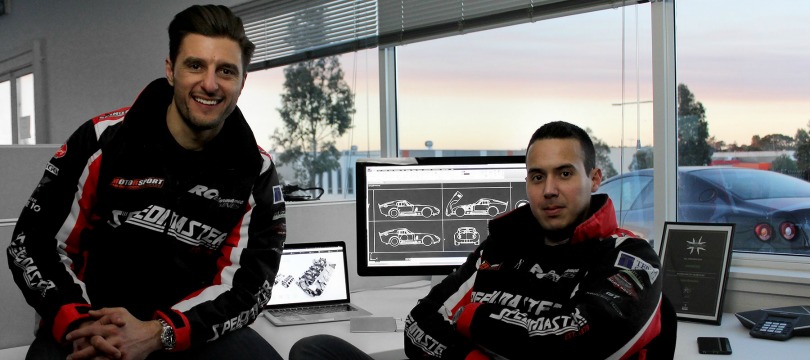How Speedmaster plans to become the Tesla of muscle cars

Automotive parts manufacturer and online retailer, Speedmaster, is expanding into automobile manufacturing, with the launch of a new range of custom-built and electric muscle cars.
“We’re officially becoming an auto manufacturer, which is insane,” said Speedmaster CEO Jason Kencevski, pictured above (left) with Erickson Pereira, Speedmaster’s chief marketing technology officer.
Based in Sydney, Speedmaster is Australia’s largest supplier of aftermarket automotive parts and specialises in developing and mass producing new parts for classic cars, especially muscle cars.
The company is on track to become the largest supplier of aftermarket auto parts in the US in 2018, according to Kencevski, who over the past 12 years has turned his dad’s bricks-and-mortar store in Wollongong into a global online business with over 460 employees in Australia, China and the US and a 75,000-square-foot distribution centre in Los Angeles.
Speedmaster is now embarking on an ambitious new project to build its first custom muscle car from start to finish. Speedmaster will supply everything except the chassis and panels, which it has sourced from an American manufacturing company that has the rights to replicate three iconic car designs.
Manufacturing of the first car will begin in Los Angeles this Wednesday, 6 September, and Kencevski will drive the finished product to SEMA, the industry’s top trade show, in Las Vegas on 1 November. The whole process will be filmed for a reality television show in the US.
The market for custom cars
Unlike Ferraris and Lamborghinis, which are simply very expensive cars, classic muscle cars are extremely rare. And since manufacturers must get approval to make replicas, even new builds, like Speedmaster’s, are hard to come by.
This has created a highly lucrative niche market, and Kencevski is confident that Speedmaster can bring in at least US$10 million per year through custom car builds, which he said represents less than five per cent of the company’s current turnover.
“Anywhere between US$10 million and US$50 million is definitely achievable within the first three years,” he said.
According to Kencevski, the first car – based on the Shelby Daytona Cobra Coupe – has already been sold to a sheikh for more than US$500,000. For reference, one of the original six Shelby Daytona Coupes, which were built for auto racing in 1964-65, recently sold for US$7.25 million.
Going forward, Speedmaster will manufacture a few custom cars for collectors and enthusiasts each year, but they’re just the means to an end. Ultimately, Kencevski wants to mass produce electric muscle cars, which would be a world first.
“The barrier to entry to produce these cars is immense. But everything we do is niche, and that’s why we’ve been so hard to follow,” he said.
Kencevski said Speedmaster plans to ‘mass produce’ 12 electric cars per year, priced between US$260,000 and US$500,000. The key selling point is the electrical engine patented by a Speedmaster engineer, which has twice the horsepower of a Tesla engine, but requires half the energy.
“We just want to stake a claim that Speedmaster can innovate in petrol-powered cars and electric-powered cars. At the moment, GM and Ford are struggling [with electric cars]. They’re amazing at mass-production, but they can’t rival us in innovation,” he said.
“I hope we can achieve that same sort of recognition up against the likes of Tesla. We may never be selling 50 million cars a year, but the 500 we do sell will be just as innovative, if not more, than Tesla.”
Kencevski said he is currently in talks to sell Speedmaster cars through showrooms in the US that specialise in exotic cars, but he is more interested in the offline expansion opportunities around manufacturing.
“One of the biggest things we’re looking at now is to partner with the government [in the US and Australia] to bring back manufacturing from China,” he said, noting that Speedmaster currently manufactures around 60 per cent of its parts in China, with the rest split between the US and Australia.
If Speedmaster succeeds, it could be responsible for reviving the car manufacturing industry in Australia, which would be a “pretty good” achievement, according to Kencevski.
Comment Manually
You must be logged in to post a comment.

No comments